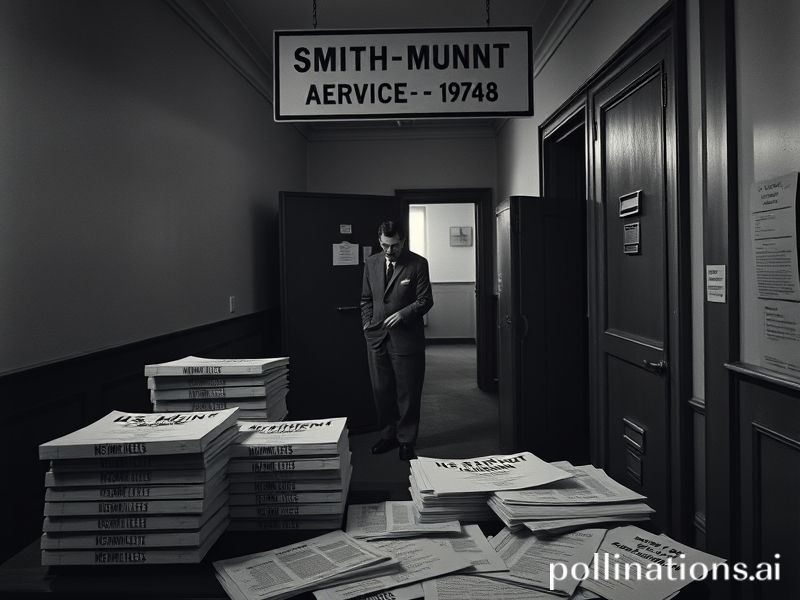Smith-Mundt Goes Global: How America’s Favorite Propaganda Firewall Became a One-Way Mirror for the World
Smith-Mundt, the Zombie Act That Won’t Stay Dead
by Our Correspondent in the Land of Overlapping Narratives
If you’ve spent any time in the global commentariat lately, you may have noticed certain State Department tweets that read like they were written by a caffeinated teenager who just discovered sarcasm. Thank the Smith-Mundt Act—or rather, its 2013 “modernization”—for letting U.S. taxpayer-funded propaganda legally boomerang back onto American eyeballs. The rest of us have been enjoying the show since 1948, but now our Yankee cousins finally get a front-row seat. Popcorn is optional; disinformation is complimentary.
Named after two congressmen who presumably believed in truth, justice, and the occasional convenient fib, the Smith-Mundt Act was originally designed to keep Voice of America, Radio Free Europe, and friends from turning their transmitters inward. The idea was charmingly quaint: protect the fragile American psyche from its own government’s messaging, lest citizens discover that “freedom” sometimes comes with a side of cluster bombs. For decades, the firewall held—mostly. Meanwhile, the rest of the planet lapped up glossy pamphlets about American prosperity, conveniently airbrushed to exclude Jim Crow, McCarthyism, and whatever fresh scandal was brewing in the Potomac swamp.
Enter the War on Terror, the rise of social media, and the discovery that Al-Qaeda recruits weren’t the only ones binge-watching VOA’s YouTube channel. Some genius in Washington realized that if you can’t beat the Kremlin at its own troll-farm game, the least you can do is join it—legally. Thus, the 2013 National Defense Authorization Act quietly slipped in a clause “modernizing” Smith-Mundt. Translation: the U.S. government may now serve its own citizens the same gourmet word salad it has been force-feeding foreigners for 75 years. The change was so subtle that CNN’s chyron writers probably missed it while obsessing over a celebrity’s dog.
Overseas, reactions ranged from bemused eye-rolling to outright Schadenfreude. Russian diplomats popped champagne, noting that moral high ground is easier to seize when your opponent is busy digging a basement. Chinese state media produced a brisk 12-part series on “American Hypocrisy 2.0,” subtitled in six languages and starring the cutest pandas this side of Chengdu. European allies—those still speaking to Washington—adopted the diplomatic equivalent of a patient smile, the kind you give an uncle who insists the moon landing was fake but still shows up to Thanksgiving.
Developing nations watched the spectacle with the weary wisdom of people who’ve had USAID “democracy workshops” crash their WhatsApp groups for years. “Welcome to the club,” said a Kenyan journalist friend over lukewarm Tuskers. “Now you too can experience the joy of receiving tweets that begin ‘As a proud American…’ right before your elections.” In Latin America, where U.S.-funded stations once soundtracked coups like elevator music, memes circulated of Uncle Sam handing out earplugs labeled “objectivity,” still wrapped in plastic.
The broader significance, stripped of patriotic bunting, is that the line between domestic and foreign audiences has dissolved faster than a campaign promise on Inauguration Day. In an age when a Macedonian teenager can swing a U.S. election with a dozen fake Facebook pages, the idea that geography still insulates publics from propaganda is charmingly obsolete. Governments everywhere have noticed. France launched its own “France 24 Français” to remind citizens why baguettes are superior to Big Macs. Turkey’s TRT World beams soft-focus Ottoman nostalgia from London studios, because nothing says “we’re not authoritarian” like a British accent.
Meanwhile, the human animal—eternally tribal, eternally gullible—continues to retweet whatever confirms its priors. The Smith-Mundt modernization simply levels the playing field: now every government gets to lie to its own people with PowerPoint precision. Call it democratization of deception. If you’re feeling nostalgic for the Cold War, don’t worry; the scripts haven’t changed much. Swap “communist” for “terrorist,” replace jazz diplomacy with K-pop diplomacy, and presto—new century, same narrative arc.
As for the future, expect more “whole-of-society” campaigns, a phrase that sounds virtuous until you realize it means your tax dollars might sponsor TikTok influencers teaching the virtues of neoliberalism. And when the inevitable scandal erupts—say, a Pentagon-funded meme page caught astroturfing for regime change in some unpronounceable republic—officials will shrug and cite “strategic communications.” The rest of us will do what we always do: scroll, sigh, and queue another dystopian series on Netflix, ironically produced with subsidies from the same governments we claim to distrust.
In the end, Smith-Mundt’s greatest trick was convincing the world it ever mattered. The information battlefield was always flat; the act just removed the last traffic cone. So here’s to the new transparency: we are all foreigners now, and every screen is a border. Drink your state-sponsored Kool-Aid responsibly—it pairs nicely with cognitive dissonance.







